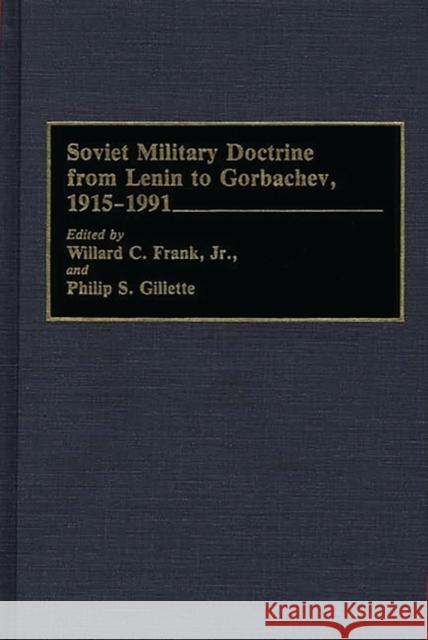Soviet Military Doctrine from Lenin to Gorbachev, 1915-1991 » książka
Soviet Military Doctrine from Lenin to Gorbachev, 1915-1991
ISBN-13: 9780313277139 / Angielski / Twarda / 1992 / 448 str.
The more uncertain the developments in Russia and the rest of the former Soviet Union become, the more urgent is the need to understand Soviet military thinking over 75-year span of Soviet history. Although other books discuss various aspects of Soviet military thought, this study by senior scholars more thoroughly combines the perspectives of history and the social sciences to understand Soviet military doctrine, experience, and tendencies from its birth with Lenin's militarization of Marxism in 1915 to the far-reaching changes introduced by Gorbachev--with all the attendant dilemmas and tensions up to the coup and revolutionary upheavals of 1991. This appraisal of the Soviet way of war is significant for scholars and professionals in Soviet studies, military affairs, and international politics.
This collection shows how ideology, technology, experience, and personalities have shaped Soviet military doctrine since the Bolshevik Revolution. This study defines the shifting interplay of defensive and offensive strategies at different times, various policies for dealing with perceived threats of nuclear or conventional war, and reviews current discussions and future policy directions. First, the book describes the form and content of Soviet military doctrine from Lenin's creation of its premises in 1915 until Gorbachev's refutation of these premises in the late 1980s and early 1990s. Next, the book examines Soviet military thinking in light of the experiences of World War I and the Russian Civil War, the episodes of the interwar years, World War II, and the Cold War. The book then assesses the key issues that have marked the changing political and military landscape in the last years of the pre-coup Soviet Union. Included is the text of the last full statement of Soviet military doctrine before the coup and the breakup of the old Soviet Union. Finally, the book presents a window into the enduring proclivities of the Soviet/Russian way of war to provide a context for meeting the future and tempering its uncertainties. A concluding bibliographical essay points to significant literature on Soviet military doctrine.











